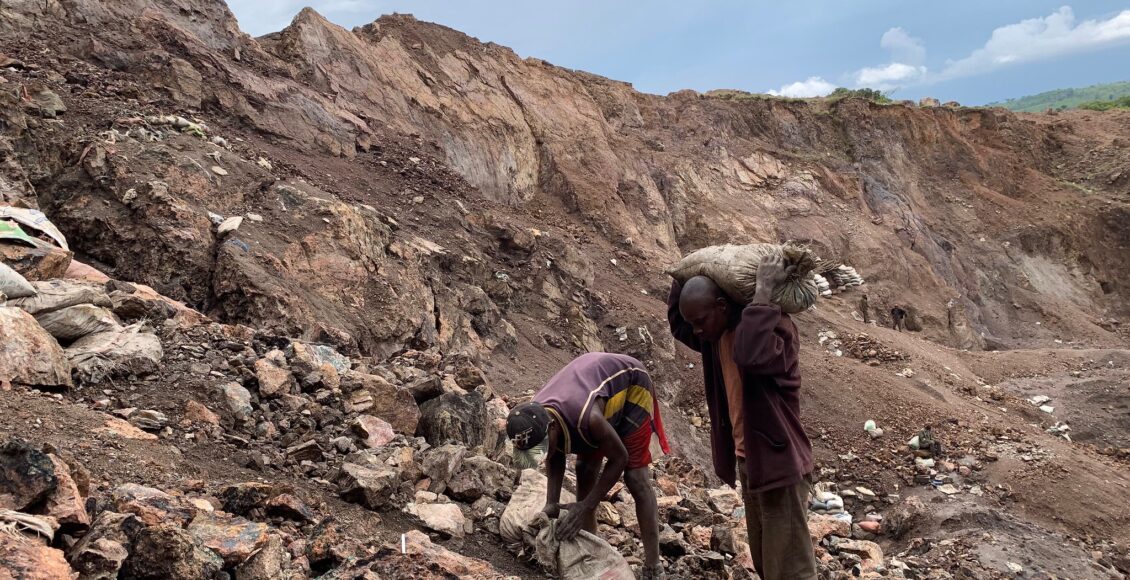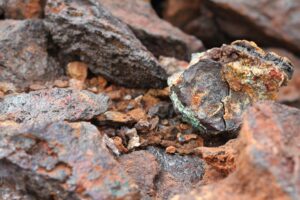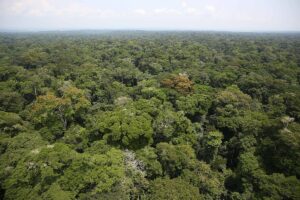The New Resource Curses of the Green Economy
There is a deeply ugly and violent underside to the idealistic goals of the green economy, whose reckoning is fast approaching.

The Democratic Republic of Congo (DRC) has recently received considerable international attention as a consequence of its poor cobalt mining practices. Cobalt is a key component within lithium-ion batteries, and with these being used in virtually any object requiring a battery, demand for the metal is exorbitantly high. Today, the DRC accounts for 70 percent of global production and is estimated to be sitting on half of the world’s reserves. Industrial mining has failed to keep pace with demand, and an unregulated artisanal mining sector relying on harmful labour regimes has emerged to account for 20 percent of total production as a way of filling the gap. In addition to the environmental destruction engendered by cobalt extraction, these practices showcase the human cost of cobalt extraction. Between the metal’s high toxicity, the poor mining conditions, and the lack of safety regulations surrounding the handling of the mineral, injuries and health conditions caused by contact with cobalt occur with disturbing frequency in DRC, and there exists a disproportionately high death rate among workers. Oversight is nonexistent, and the product typically reaches the market through local traders with no qualms about sourcing. Most cobalt is shipped to China for refinement, and the sheer volume of export, market price shocks, and unflinching high demand have made ethical sourcing difficult.

There is growing pressure for more ethical conditions, but the DRC is beholden to upstream global factors and cannot be blamed entirely for the endemic issues in the cobalt mining process. Demand for cobalt has skyrocketed in recent years due in large part to the increasing popularity of electric vehicles, the expansion of green infrastructure, and a higher aggregate demand for electronics worldwide. Prices have risen correspondingly, and many within the impoverished country are eager to cash in. The materials and processes involved in the manufacturing of electronics are largely unknown to consumers despite their prominent place in daily life. When faced with the option of taking an activist stance — largely invisible to the consumer — to ensure ethical supply at the expense of profits and market share, most companies will choose to turn a blind eye. The DRC’s brutal and unjust labour regimes produce a separate but equally damaging cycle: unpaid forced labour keeps commodity prices low which disincentivizes producers from exploring recycling processes as it is cheaper to simply mine more.
Despite the urgent need for a transition from fossil fuels, the Congolese situation serves as a case study of the new resource curse produced by green infrastructure development and highlights the destabilizing effects of the accompanying resource demands. The cobalt extraction process carries environmental and human costs that have the potential to undercut progress made toward decarbonization. Corruption in the cobalt industry has historically been extremely common, and several leaders have been either killed or deposed for attempting to assert greater sovereignty over mineral wealth. Communities near deposits are routinely displaced, and large sections of rainforests of equal or greater importance in the fight against climate change have been cut down to access the minerals beneath them. Poverty rates have skyrocketed as rural peoples have been forced to either reconfigure their traditional lifestyles or integrate into brutal mining labour regimes. Profits of cobalt mining are unequally distributed, and foreign mine ownership means that the lion’s share of earnings is sent abroad. The DRC is far from being the only case in which increased global demand for rare earth minerals has brought increased instability; states abundant in lithium, copper, and other scarce resources necessary for the manufacturing of electronic goods have generally seen an increase in political turmoil and outside pressures due to both the value and exclusivity of their mineral wealth. Bolivia and Peru are perhaps the most prominent examples of this trend; Bolivia’s president was forced out of office under threat of violence by the US-backed right-wing opposition party in 2019 over a refusal to allow foreign access to its abundant lithium deposits. The ongoing Peruvian protests are rooted in corporate access to copper deposits on indigenous land.

Just as oil and precious metals produced authoritarianism and instability throughout the 20th century, rare earth minerals can be expected to do the same as the transition to green energy progresses. If anything, the current trend is seemingly on track to produce an even more concentrated and destructive pressure due to the concerned resources’ remarkably uneven distribution. The existing reserves of the minerals required for batteries and electronic components are concentrated within certain geographical locations, producing a precarious dynamic in states with abundant deposits that have suddenly become extremely profitable. As a result, these select states, most of which are impoverished nations in the Global South, have suddenly gained immense economic power. Logically so, the abilities of their political institutions now do not match the countries’ economic capacities, which has therefore left them unable to successfully maintain equity and stability.
Controlling these precious minerals gives states the potential to establish an unprecedented degree of hegemony, due to both the universality of their application and the depth of their integration in the functioning of the global economy. Global powers have been circling states abundant in key minerals — motivated by the demands of corporations — and a scramble to assert control over the supply has begun. The DRC has introduced a statewide monopoly on the international sale of artisan-produced cobalt, although the vast majority of the industrial licenses are owned by international interests. The country remains poverty-stricken despite their massive mineral wealth, a testament to the truly deep-seated presence of corruption, both locally and internationally.
There is a deeply ugly and violent underside to the idealistic goals of the green economy, whose reckoning is fast approaching. The noble values of the green revolution are tainted by the overt exploitation and imperialism of states acting on behalf of their corporate interests. The instability of newly resource-rich states, whose mineral deposits are the invisible backbone of the tech industry, underlines exactly how the transition to resource-intense green alternatives is a lateral shift rather than a solution. However, despite the toll, it is hard to argue against the necessity of cobalt. There is a concerted effort to innovate alternatives to lithium-ion batteries which would rely on more easily accessible resources, though this is unlikely to happen any time soon. Despite the burdens of abundance, the DRC has the potential to emerge as a major global player; just as oil producers can leverage production to control the price, the DRC’s unique position on the world stage is an opportunity for them to do the same, thus escaping the cycle of poverty and exploitation.
Edited by Enora Lauvau
Artisal Cobalt Miners in the Congo. “Artisanal Cobalt Mining” by the International Institute for Environment and Development Photostream under C.C. B-NC-ND 20.
